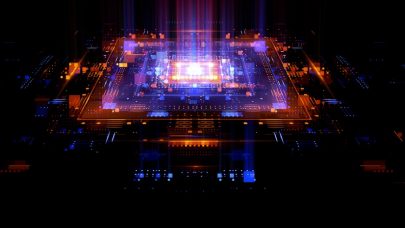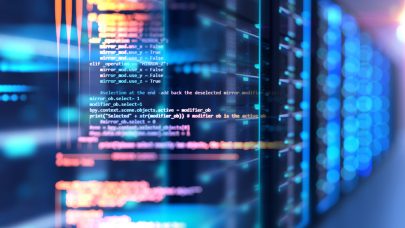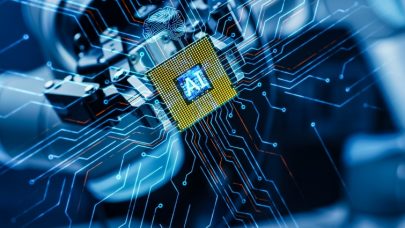June 28, 2022 — Mansi Sakarvadia, a University of North Carolina at Chapel Hill student who is working as a research aide at the Argonne Leadership Computing Facility (ALCF), was recently named one of the 33 recipients of the U.S. Department of Energy’s (DOE) prestigious Computational Science Graduate Fellowship (CSGF). The ALCF is a DOE Office of Science user facility at Argonne National Laboratory.

As a DOE CSGF Fellow, Sakarvadia will be able to further her work in applying high-performance computing (HPC) to computer science research and connect with fellow researchers to help pursue her thesis.
Last summer, Sakarvadia participated in the ALCF’s summer student internship program, working on a project that involved optimizing deep learning applications for supercomputers. She returned to the ALCF this year to work as a research aide with the data science group.
In this Q&A, Sakarvadia discusses what sparked her interest in scientific computing, her current research projects, and her future aspirations.
Can you start off by telling us what inspired you to pursue a career in computational science?
I had a very enjoyable and formative experience completing a Summer Undergraduate Learning Internship (SULI) in 2021 at the Argonne Leadership Computing Facility (ALCF). The project I worked on that summer (FLOPs Aware Deep Learning) captivated my interests and helped me realize I wanted to continue working on problems of a similar flavor in the future. The project experience, as well as the mentorship I received from my supervisors, Kyle Felker and Taylor Childers (and the entire ALCF data science team), helped me realize how many exciting research questions existed within the broad field of computational science. My positive experiences at Argonne, as well as several computational science research projects I had been involved in at my undergraduate institution, ultimately sealed the deal and inspired me to pursue a computational science-focused research career.
What type of work have you been involved in at the ALCF?
For my SULI appointment in 2021, my “FLOPs Aware Deep Learning” project focused on exploring methods to design computational cost-aware neural networks that automatically maximize the throughput of the target hardware given a specific set of deep learning frameworks and libraries. After the position ended, I talked with my summer mentors and decided to come back to the ALCF as a research aide working on additional projects broadly related to the benchmarking and integration of Vision Transformers (a type of neural network architecture) into scientific workflows. I was able to become highly experienced with the ALCF’s ThetaGPU machine, exploring the lowest level architectural details of the A100 GPUs and training neural networks across dozens of the devices in parallel.
What drew you to apply for the DOE Computational Science Graduate Fellowship?
I initially learned of the DOE Computational Science Graduate Fellowship from my ALCF mentor, Kyle Felker, who is an alum of the fellowship. After doing some additional research on my own, I decided that the fellowship’s goals aligned with my own. I was especially excited to apply to the fellowship because recipients are required to conduct a research practicum at a DOE laboratory at some point during their Ph.D. studies on a topic unrelated to their thesis. Due to my positive experience working at Argonne, I felt that this opportunity would be a unique way to explore additional interdisciplinary research areas that expand my scope of knowledge.
How will your experience at the ALCF impact your work with the CSGF program?
My time at the ALCF is what initially exposed me to high-performance computing and challenged me to think about the types of problems that come with computing on large systems. As it is a major focus of the CSGF program, I feel that my ALCF experience has equipped me with foundational tools to carry out research in this area.
Can you tell us what areas of research you plan to focus on with your fellowship?
Broadly, I am interested in machine learning and high-performance computing, and would be excited to work on any number of problems that lie at the intersection of the two fields. Currently, I am hoping to apply research methods to build scalable, privacy-preserving machine learning models for high-performance scientific workflows. I am also interested in environmental science and would love to apply my computer science research to environmental science applications.
What aspect(s) of the fellowship do you look forward to most and what do you hope to get out of the program?
I am most excited about participating in the practicum– I hope that the experience will provide skills that complement my thesis work but also broaden my research focus. I am also looking forward to building a network with DOE researchers, current fellows, and CSGF alumni. I hope that this experience will allow me to remain involved with DOE research throughout my career.
The Argonne Leadership Computing Facility provides supercomputing capabilities to the scientific and engineering community to advance fundamental discovery and understanding in a broad range of disciplines. Supported by the U.S. Department of Energy’s (DOE’s) Office of Science, Advanced Scientific Computing Research (ASCR) program, the ALCF is one of two DOE Leadership Computing Facilities in the nation dedicated to open science.
Argonne National Laboratory seeks solutions to pressing national problems in science and technology. The nation’s first national laboratory, Argonne conducts leading-edge basic and applied scientific research in virtually every scientific discipline. Argonne researchers work closely with researchers from hundreds of companies, universities, and federal, state and municipal agencies to help them solve their specific problems, advance America’s scientific leadership and prepare the nation for a better future. With employees from more than 60 nations, Argonne is managed by UChicago Argonne, LLC for the U.S. Department of Energy’s Office of Science.
The U.S. Department of Energy’s Office of Science is the single largest supporter of basic research in the physical sciences in the United States and is working to address some of the most pressing challenges of our time. For more information, visit https://energy.gov/science.
Source: Logan Ludwig, ALCF

































































